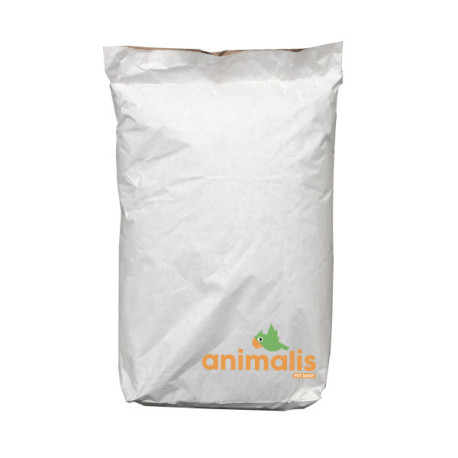





Reference: 103065200
Yellow millet is rich in vitamins and minerals and is an alkaline (non-acidic) cereal. It is part of the basic diet of parakeets, exotic birds and exotic doves.
Millet contains magnesium, phosphorus, iron, potassium, manganese, vitamin A, vitamin B1, vitamin B2, vitamin PP (nicotinic acid) and vitamin B5.
Yellow millet is rich in vitamins and minerals and is an alkaline (non-acidic) cereal. It is part of the basic diet of parakeets, exotic birds and exotic doves.
Millet contains magnesium, phosphorus, iron, potassium, manganese, vitamin A, vitamin B1, vitamin B2, vitamin PP (nicotinic acid) and vitamin B5.
Dimensions: 20kg
Common names:
Wild teasel, Birds' cabaret, Venus' basin, Wolf's comb [Fr], Grote kaardebol [Nl], Wilde Karde [De], Cardo dei lanaioli, Scardaccione selvatico [Il], Cardencha, Cardo de cardador [Es].
Improves liver and overall health of birds.
Suitable for a wide range of birds, including parrots, canaries, budgerigars, and other exotic birds.
Benefits for birds:
- Liver support.
- Detoxification: Helps eliminate toxins from the liver and improves digestion.
- Strengthening the immune system.
Instructions for use:
Dosage: Add a small amount (usually a teaspoon per day) to the birds' usual seeds. The amount may vary depending on the size and specific needs of the birds. Can be mixed with the birds' daily food.
Precautions:
Store in a cool, dry place, away from moisture and direct sunlight.
Yellow millet is rich in vitamins and minerals and is an alkaline (non-acidic) cereal. It is part of the basic diet of parakeets, exotic birds and exotic doves.
Millet contains magnesium, phosphorus, iron, potassium, manganese, vitamin A, vitamin B1, vitamin B2, vitamin PP (nicotinic acid) and vitamin B5.
These seeds rich in fat and protein are especially appreciated by wild birds. They will attract sizerins, finches, goldfinches, black-capped, sparrows, mourning doves and a host of other birds to your garden. It is often used as a replacement for the shuttle, which is more expensive.
The flaxseed consists of 40 to 45% oil and 25% protein. Flaxseed preserves very well. It contains, in particular, two fatty acids with similar names (both derived from the word "lin"), linolenic acid (an omega-3) and linoleic acid.
The seed is used in animal feed, particularly for laying hens for which an increase in the omega-3 content of the eggs is desired.
Due to these properties, this seed aids digestion.
Clover stimulates the immune system and slows down cellular ageing through its excellent antioxidant properties. Rich in vitamins B, C, E and provitamin A.
A 100% natural product that is mixed with breeding or with food; It doubles in size by adding water.
Carrots are very rich in vitamins with a high proportion of vitamin A and carotene, as well as vitamin B, calcium and valuable carbohydrates.
Birds like to remove the shells from peanuts and then eat the peanuts. Peanuts are a source of energy, which is very important for the long winter months.
Unpeeled peanuts can be given to parrots as a treat.
Paddy Rice 20kg - Versele-Laga
Paddy rice seed or raw rice that is very suitable for exotic birds with strong beaks such as padda and birds of Asian origin. This seed is also appreciated by parakeets, parrots and exotic doves.
These seeds, rich in fats and proteins, are particularly appreciated by wild birds. They will attract redpolls, grosbeaks, goldfinches, black-capped chickadees, sparrows, mourning doves, and a host of other birds to your garden. They are often used as a substitute for rapeseed, which is more expensive.
Flaxseed is rich in omega 3, which is essential for the cardiovascular system.
Niger seed is a bird seed rich in phosphorus and calcium.
Niger seeds (or nyjer seeds) are fine seeds rich in oil.
They come from Guizotia abyssinica (also called Oleiferous Guizotia).
Niger is very popular with most birds, goldfinches and tarins love it.
Niger is one of the few bird seeds with a good calcium/phosphorus ratio.
They have the property of binding to minerals such as calcium, iron and zinc and making them less bioavailable.
This seed from switchgrass is rich in protein (12.6%) it also contains 60% carbohydrates and less than 5% fat.
It is the richest variety of millet in protein. Japanese millet is recommended to all breeders of exotics, natives, parakeets, large parakeets.
Pine seeds are a good source of Phosphorus, Magnesium, Zinc, Manganese, Copper, Iron, Vitamin E, K, B1, B2, B3, B9.

Yellow millet is rich in vitamins and minerals and is an alkaline (non-acidic) cereal. It is part of the basic diet of parakeets, exotic birds and exotic doves.
Millet contains magnesium, phosphorus, iron, potassium, manganese, vitamin A, vitamin B1, vitamin B2, vitamin PP (nicotinic acid) and vitamin B5.
